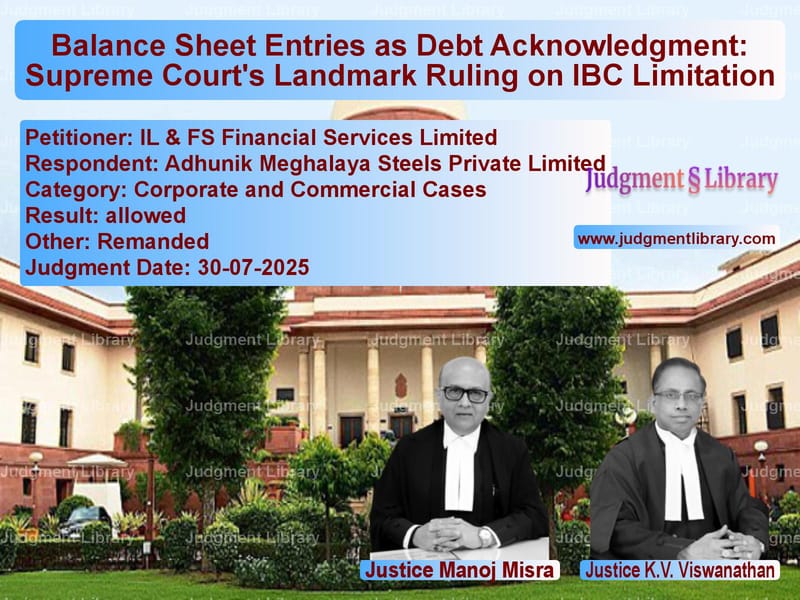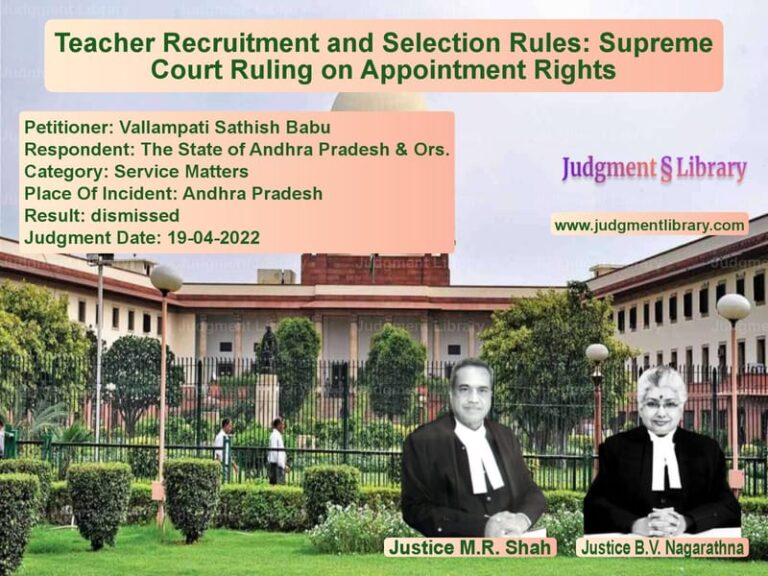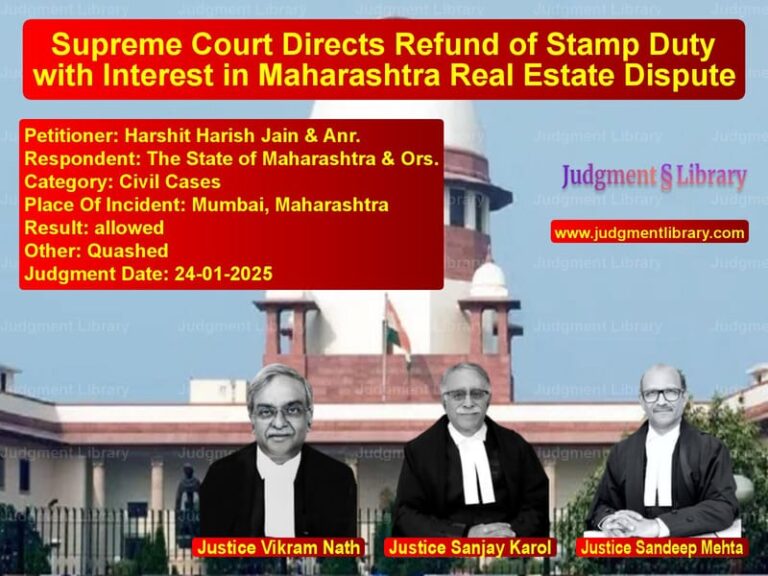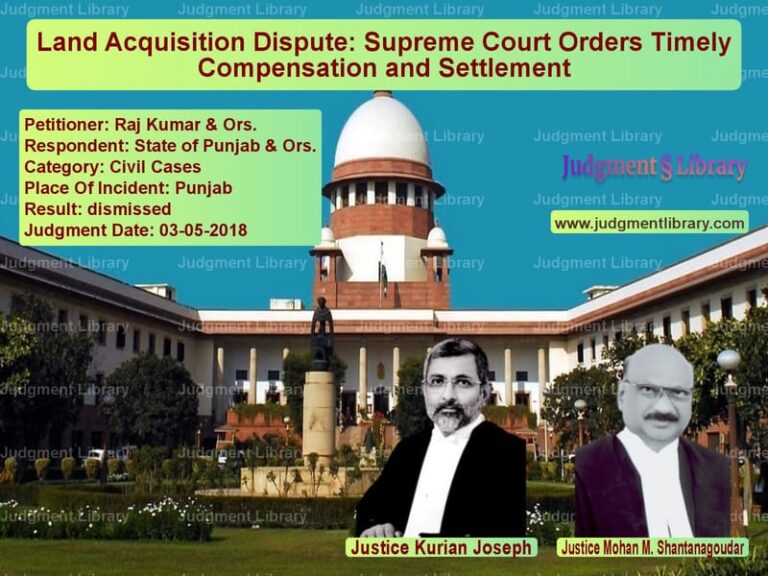Balance Sheet Entries as Debt Acknowledgment: Supreme Court’s Landmark Ruling on IBC Limitation
In a significant ruling that clarifies the complex interplay between corporate accounting practices and debt recovery laws, the Supreme Court of India recently delivered a judgment that could have far-reaching implications for financial creditors and corporate debtors alike. The case between IL & FS Financial Services Limited and Adhunik Meghalaya Steels Private Limited centered on a fundamental question: Can entries in a company’s balance sheet serve as valid acknowledgment of debt under the Insolvency and Bankruptcy Code, 2016? The dispute, which traveled through the National Company Law Tribunal and its appellate counterpart before reaching the Supreme Court, involved a loan agreement dating back to 2015 and raised crucial questions about limitation periods and what constitutes proper acknowledgment of financial liabilities.
The story began on February 27, 2015, when IL & FS Financial Services Limited extended a term loan facility of Rs. 30 crores to Adhunik Meghalaya Steels Private Limited. The loan was secured by a pledge of 8,10,804 shares of Adhunik Metaliks Ltd. However, financial troubles soon emerged, and on March 1, 2018, the respondent’s account was declared a Non-Performing Asset (NPA) as it failed to meet its debt obligations. The financial creditor issued a recall notice on August 10, 2018, but received no response. What followed was a legal battle over whether the corporate debtor’s financial statements, particularly the balance sheet for the financial year 2019-20, constituted a valid acknowledgment that would extend the limitation period for initiating insolvency proceedings.
The appellant, IL & FS Financial Services, filed an application under Section 7 of the IBC on January 15, 2024, claiming a default amount of Rs. 55,45,97,395. The crux of their argument rested on the balance sheet entries from 2015-16 to 2019-20, which they claimed amounted to continuous acknowledgment of the debt. They particularly emphasized the balance sheet for 2019-20, signed by the directors on August 12, 2020, arguing that this date should be considered the fresh starting point for computing limitation. The appellant also sought the benefit of the Supreme Court’s COVID-19 limitation extension orders, contending that the entire period from March 15, 2020, to February 28, 2022, should be excluded from limitation calculations.
The Legal Battle in Lower Tribunals
The National Company Law Tribunal, Guwahati Bench, took a different view. It held that there was no acknowledgment of liability in the balance sheet for 2019-20 because the name of the financial creditor did not appear. The NCLT concluded that the application was barred by limitation and should have been filed by May 30, 2022, applying the Supreme Court’s limitation extension order. When the matter reached the National Company Law Appellate Tribunal, it affirmed the NCLT’s decision, examining whether the date of signing the balance sheet or the date of uploading it to the Ministry of Corporate Affairs website would be relevant for computing limitation. The NCLAT held that the signing date was crucial and, on that basis, maintained that the Section 7 petition should have been filed by May 30, 2022. Dissatisfied with these findings, IL & FS Financial Services approached the Supreme Court, setting the stage for a definitive ruling on these critical issues.
The Arguments Before the Supreme Court
Before the Supreme Court, Mr. Ritin Rai, learned Senior Counsel for the appellant, presented a compelling case. He argued that the entries in the balance sheet for 2019-20 clearly constituted acknowledgment of debt under Section 18 of the Limitation Act. He emphasized that taking August 12, 2020—the date of signing the financial statements—as the commencement date, limitation would ordinarily be available until August 11, 2023. When combined with the COVID-19 limitation extension, which excluded the period from March 15, 2020, to February 28, 2022, the appellant had time until February 27, 2025, to file the application. Therefore, the January 15, 2024 filing was well within the limitation period.
The respondent, represented by Mr. Ramji Srinivasan, learned Senior Counsel, countered these arguments vigorously. He contended that the balance sheet for 2019-20 nowhere mentioned the appellant’s name and thus could not be construed as acknowledging any jural relationship between the parties. He pointed to mismatches between the debt claimed in the Section 7 application and the amounts shown in the balance sheet. The respondent’s counsel distinguished the appellant’s reliance on the Vidyasagar Prasad case, arguing that it was decided on its specific facts and did not lay down general principles. He defended the tribunals’ application of the Supreme Court’s limitation extension order, insisting that the limitation for filing the application expired on May 30, 2022, making the January 2024 filing hopelessly time-barred.
The Supreme Court’s Legal Analysis
The Supreme Court, comprising Justices Manoj Misra and K.V. Viswanathan, delved deep into the legal principles governing acknowledgment of debt. The Court began by examining Section 18 of the Limitation Act, which provides that where an acknowledgment of liability is made in writing and signed by the party against whom the right is claimed, a fresh period of limitation shall be computed from the time of such acknowledgment. The Court revisited its landmark judgment in Khan Bahadur Shapoor Freedom Mazda v. Durga Prasad Chamaria, where it was held that “acknowledgment as prescribed by Section 19 merely renews debt; it does not create a new right of action. It is a mere acknowledgment of the liability in respect of the right in question; it need not be accompanied by a promise to pay either expressly or even by implication. The statement on which a plea of acknowledgment is based must relate to a present subsisting liability though the exact nature or the specific character of the said liability may not be indicated in words. Words used in the acknowledgment must, however, indicate the existence of jural relationship between the parties such as that of debtor and creditor, and it must appear that the statement is made with the intention to admit such jural relationship.”
The Court emphasized that intention to admit jural relationship could be inferred from the nature of the admission and need not be expressed in words. It also noted that surrounding circumstances could always be considered, and courts generally lean in favor of liberal construction of such statements. The judgment in Lakshmirattan Cotton Mills Co. Ltd. was cited, where the Court had considered previous correspondence and surrounding circumstances to determine whether a document constituted valid acknowledgment. Most significantly, the Court referred to Asset Reconstruction Co. (India) Ltd. v. Bishal Jaiswal, which categorically held that entries in balance sheets could constitute valid acknowledgment. The Court in Bishal Jaiswal had observed that “entries in Balance Sheet had to be examined on a case-by-case basis to examine whether an acknowledgment of liability exists.”
The Court’s Application of Legal Principles
Applying these principles to the facts, the Supreme Court found that the balance sheet for 2019-20, when viewed in the context of previous years’ financial statements, clearly constituted valid acknowledgment. The Court noted several compelling factors: the general tenor and context of the 2019-20 balance sheet, considered alongside the surrounding circumstances from previous years, pointed to the entry pertaining to the same borrowing reflected consistently since 2015-16. The cash flow statement appended to the financial statements showed proceeds from borrowings of Rs. 72,30,902 in 2018-19, which when added to the 2017-18 figure of Rs. 23,68,91,933, resulted in the 2019-20 figure of Rs. 24,41,22,835. Most importantly, the cash flow statement indicated that no part of the cash flow proceeds was utilized in repaying existing borrowings, clearly showing that the debt remained unpaid.
The Court rejected the respondent’s argument that the absence of the creditor’s name invalidated the acknowledgment, referring to Vidyasagar Prasad where a similar argument had been repelled. The Court noted that the statutory format for balance sheets under the Companies Act does not require naming every secured or unsecured creditor. It also observed the respondent’s weak defense—a bare denial in their reply that the balance sheet could be treated as acknowledgment, without substantiating why the consistent entries across years did not acknowledge the debt.
The Limitation Extension Question
On the crucial question of which part of the Supreme Court’s COVID-19 limitation extension order applied, the Court had no doubt that Paragraph 5(I) of the January 10, 2022 order governed the situation. This provision excluded the entire period from March 15, 2020, to February 28, 2022. Since the acknowledgment dated August 12, 2020, fell within this period, limitation would commence on March 1, 2022, and continue until February 28, 2025. The Court clarified that Paragraph 5(III), which provided a 90-day window from March 1, 2022, applied only where limitation would have expired between March 15, 2020, and February 28, 2022—a scenario not applicable here since limitation had been freshly computed from the acknowledgment date.
The Final Verdict and Its Implications
In its concluding remarks, the Supreme Court allowed the appeal, setting aside the judgments of both the NCLAT and NCLT. The matter was remitted to the adjudicating authority to proceed with the Section 7 application, treating it as filed within limitation. The Court’s ruling reinforces the principle that balance sheet entries, when read in context and considering surrounding circumstances, can constitute valid acknowledgment of debt under Section 18 of the Limitation Act. This judgment provides much-needed clarity for financial creditors relying on corporate debtors’ financial statements to establish continuing acknowledgment of liability. It also emphasizes that technical objections about the absence of creditor names in balance sheets cannot override the substantive evidence of acknowledgment when read in the proper context. For corporate debtors, the judgment serves as a reminder that consistent entries in financial statements about borrowings may be construed as acknowledgment, potentially extending limitation periods significantly. The ruling balances the interests of financial creditors seeking to recover legitimate dues with the need for corporate debtors to maintain transparent financial records, ultimately strengthening the framework of the Insolvency and Bankruptcy Code.
Petitioner Name: IL & FS Financial Services Limited.Respondent Name: Adhunik Meghalaya Steels Private Limited.Judgment By: Justice Manoj Misra, Justice K.V. Viswanathan.Judgment Date: 30-07-2025.Result: allowed.
Don’t miss out on the full details! Download the complete judgment in PDF format below and gain valuable insights instantly!
Download Judgment: il-&-fs-financial-se-vs-adhunik-meghalaya-st-supreme-court-of-india-judgment-dated-30-07-2025.pdf
Directly Download Judgment: Directly download this Judgment
See all petitions in Bankruptcy and Insolvency
See all petitions in Corporate Compliance
See all petitions in Company Law
See all petitions in Debt Recovery
See all petitions in Judgment by Manoj Misra
See all petitions in Judgment by K.V. Viswanathan
See all petitions in allowed
See all petitions in Remanded
See all petitions in supreme court of India judgments July 2025
See all petitions in 2025 judgments
See all posts in Corporate and Commercial Cases Category
See all allowed petitions in Corporate and Commercial Cases Category
See all Dismissed petitions in Corporate and Commercial Cases Category
See all partially allowed petitions in Corporate and Commercial Cases Category







